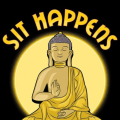Direction and the Path
We often refer to being "on the path", or "advancing along the path" and other phrasings that indicate a sort of point A to point B paradigm at work.
I wonder if this is a less than ideal outlook.
It's nearly impossible to live in the world without some kind, of duality in thinking - good/bad, on/off, right/wrong, yin/yang, yes/no, self/other, Lobster and serious ( JK, Lobster  ), and that sort of thing. Put another way, distinctions.
), and that sort of thing. Put another way, distinctions.
If we read the Heart Sutra, we can draw from it, the distinctions we rely on, even with attention paid to The Path, are in emptiness, without any real substance. Any effort to act upon those distinctions would then be futile. That's not to say that the N8FP is futile, but to view The Path as something that involves effort & progress, may very well be.
So what's left, if trying to stay on The Path, is futile? Well, we have our practice. With Shamatha, we calmly abide in the present. The distinction of being on or off the path, or headed in a right or wrong direction, becomes unimportant. Irrelevant perhaps?




Comments
Another perspective can be that...
some might consider each attempt to be present to be a step onto the path just like each attempt to avoid being present is us stepping off of it.
One of the analogies of the path, like it can be with Shamatha, is not only is it always potentially available to anyone at any time, but its whole existence is completely dependent on this one present fleeting nano second of practice.
Here, the distinction, or the path, is simply about how willing we are at any moment to be here as opposed to reclining back into our habituated inclinations to avoid being so.
I really like the yin/yang depiction of duality. The form it takes has meaning, its not simply one side light and one dark. They flow into each other, increasing and decreasing. The view it represents isn't meant to be a binary even though the terms of each are binary. And the dot in each points to the fact that each contains the seed of the other within.
In a similar way the path isn't some direct, linear progression that at one moment one isn't in and the other they are. The "Path" meanders, expands and contracts, moves forward and back.
Some systems of Buddhism kind of start at the end and ask the follower to familiarize themselves with that state. Others move gradually along, increasing the capacity of the practitioner along the way until they are ripe for deeper teachings. Each seem to have merit and some paths, I'm sure, are more suited to some than others. The best medicine is the one that treats your specific ailment and is the one you will actually take.
I'd also add that the Buddha advised us to leave the raft behind once we crossed to the other shore. The point of the path isn't the path itself, the point of the techniques we use aren't the techniques themselves. Once you're able to add 7 and 12 together in your head, no need to continue counting them off on your fingers.
The metaphor for the path that I’ve grown to like is “a gradual unfolding and revealing”. Generally with enough insight the Buddhist path is like a flower that opens, you see more and more as you move through the process, you don’t really need to do anything but to keep looking and adjusting normally to what you see. Not sure if that gets you where you want to go but it is what seems to be happening to me.
There is a Zen saying ( I think I read it in one of Christmas Humphreys books)
"When the intellect ventures into where it does not belong, it becomes lost in its own confusing"
Hence why on a personal level I try/make an effort ( the right one... karma permitting ) to keep things simple (including the so-called Path) and to the point, by not overthinking things and just focus on the following on a daily bases as best as "I" can...
Right Understanding (which encompasses the other six)
Right Thought
Right Speech
Right Action
Right Livelihood
Right Effort
Right Mindfulness
Right Concentration.
Bearing in mind that sh!# happenings...In Samsara things don't always go to plan in (Samsara a creation of a conditioned mind's projection= desires & aversions) where unsatisfactoriness tends to arise in its many forms...
When this (AKA Dukkha) happens ...

In the quote it should read "lost in its own confusion" and not confusing ...sorry for the confusion
